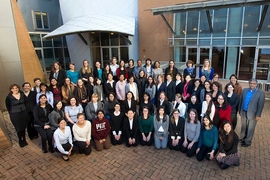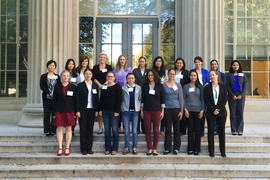A group of 20 women from around the world gathered at MIT this month to gain valuable insight and advice about careers in academia during the second Civil and Environmental Engineering Rising Stars Workshop.
The MIT Department of Civil and Environmental Engineering (CEE)-hosted event is for distinguished early-career women interested in careers in academia to hear firsthand what it is like to be a faculty member in engineering and science domains.
“The CEE Rising Stars Workshop is a unique opportunity to promote a cohort of the future female leaders in civil and environmental engineering, and to support the launch of their careers” said Markus Buehler, the McAfee Professor of Engineering and head of CEE. “It was an honor to host these exceptionally talented individuals at MIT who will move on to make important contributions to the academy and society in many different ways.”
The workshop, held on Oct. 12 and 13, introduced the participants to MIT and to research conducted in CEE. It also offered career advice for the women from current faculty members. Through a series of panels and networking sessions, the participants learned about the early stages of the faculty search process, what it is like to be a young faculty member, how to mentor students, and also about the more intimate aspects of careers in academia, such as work-life balance.
“Make sure that you interact with the faculty members that are participating here, and also with each other. You are going to be peers as you move forward in your careers, and this is a great opportunity to build a community,” Anantha Chandrakasan, dean of the School of Engineering, advised the participants on the first day of the workshop. “Take this opportunity to understand what it means to be a faculty member, but also the practical aspects of the application process. Ask questions about what you should do in your research statement, what search committees look for in terms of research vision, and so on.”
The distinguished participants were selected from an applicant pool of 100 women by a steering committee of MIT faculty, led by Colette Heald, associate professor of CEE and associate head of the department.
"The goal of the CEE Rising Stars workshop is to strengthen the pipeline to academia for women. In order to achieve that we try to demystify the faculty career as well as create a peer network for these talented early-career women," Heald said.
Other members of the Steering Committee included Institute Professor Penny Chisholm; Heidi Nepf, the Donald and Martha Harleman Professor of CEE; Carolina Osorio, an associate professor of CEE; Franz Josef-Ulm, a professor of CEE; and Bori Stoyanova, CEE’s personnel administrator.
Limited to women who have completed PhDs within the past five years, the participants all have research interests that align with civil and environmental engineering or related fields. Research interests this year included urban sustainability, solar energy, atmospheric chemistry and transportation, among others.
The two-day workshop featured research presentations, lab tours of the department’s Henry L. Pierce Laboratory for Infrastructure Science and Engineering and the Ralph M. Parsons Laboratory for Environmental Science and Engineering, faculty-led panels, and networking opportunities with MIT faculty.
Among the faculty in attendance was Tal Cohen, assistant professor of CEE and mechanical engineering, who participated in the 2015 Rising Stars Workshop. An aerospace engineer by training, Cohen joined the CEE faculty in November 2016.
“I was really lucky that Professor [Xuanhe] Zhao pointed my attention to the fact that there’s a Rising Stars workshop,” Cohen said of the 2015 event. “I didn’t apply to any other civil and environmental engineering departments, and it really opened my eyes to the option.”
Cohen also exemplifies the goals of the Rising Stars Workshop: to establish valuable professional connections and to explore possible career paths.
“This workshop provided a rare opportunity to meet other women that are exactly at the same stage in their careers, to share experiences, and to keep in touch,” Cohen said of her 2015 experience.
During this year’s Rising Stars workshop, participants gave brief overviews of their research during presentation sessions, allowing the women to become more familiar with each other’s work and observe potential overlaps in seemingly disparate research domains.
MIT faculty also held talks and panel discussions on both the professional and social aspects of working in academia. Panel topics covered the job search and interview process, insight into the first few years of being a faculty member, and work-life balance.
The first panel of the workshop covered the job search and interview process. Faculty on the panel included Buehler; Jaime Peraire, the N. Slater Professor of Aeronautics and Astronautics and head of the MIT Department of Aeronautics and Astronautics; Benedetto Marelli, the Paul M. Cook Career Development Professor of CEE; and Serguei Saavedra, the Mitsui Chair Professor of CEE.
The panelists answered questions from the participants and drew on their personal experiences and what they have seen during their careers. Topics ranged from applying to multiple schools and the value of postdoc positions, to the significance of reference letters. The panelists stressed the importance of showing the passion and innovation of research ideas in the application and interviews.
When asked about how to convey the significance of research, Marelli explained that admissions committees want to see independence in research and how one is able to differentiate themselves from previous work and start new projects. “They want to see the novel idea you can bring,” he said. “It’s all about the impact.”
Trilce Encarnación, a PhD candidate from Rensselaer Polytechnic Institute, said the panel as stood out to her at the workshop. “I think the job search and the interview process [panel] was extremely insightful. They gave us insider information about what they are expecting, so for that me that was most valuable,” she said.
As recent PhD recipients, the workshop provided participants with information about both personal and professional development. A panel on the first few years of a faculty career featured Heald; Chisholm; Osorio; and Ali Jadbabaie, the JR East Professor of CEE and the Institute for Data, Systems, and Society (IDSS) and associate director of IDSS.
Participants asked the panel about the tenure process, mentoring, securing funding, establishing industrial connections, and building one’s reputation in their fields.
“From day one, you want to think about who you think your community will be,” and to which area of expertise the participants identify, Jadbabaie suggested. He encouraged participants to attend conferences and workshops and to network with people that know their work to build their reputation.
Chisholm also advised participants to find a mentor outside of their specialty area. “I think it’s important to find someone to talk to outside of your department. Somebody who won’t be involved in your promotion and tenure. Where you can really just be yourself, talk about your concerns and challenges, your problems with your research, your interactions with colleagues, and whatever else is on your mind,” she said.
Maider Llaguno-Munitxa, a postdoc at Princeton University, explained after the panel that “the tenure-track in Europe versus the way it works here is quite different. So for me, it was a learning process in that sense. I can now really picture what a career in academia is like in the U.S. and more so at MIT.”
The final panel, on work-life balance, included Cohen, Nepf, Ulm, and Jesse Kroll, associate professor of CEE and chemical engineering. Participants asked about time management with families and careers, how to manage an academic career with a spouse, negotiating childcare, tips for efficient work, and balancing the many demands of working in academia.
Kroll emphasized the importance of looking at the bigger picture of work-life balance. “While people often talk about the balance being between work and kids, it's really something broader than that: It’s about balancing your work and what else makes you happy or is important to you,” Kroll said. Ulm echoed this sentiment, encouraging the participants to develop hobbies aside from their research — like sports, art, or music —to exercise different parts of the brain and keep participants motivated outside of work.
On the second day of the workshop, the students also had lunch with Chancellor and Ford Professor of Engineering Cynthia Barnhart, who fielded questions from participants and spoke to them about her career.
“It was a great event because it was good to meet all of those colleagues who are top in their area,” said Idil Deniz Akin, an assistant professor at Washington State University. “I would definitely suggest if anybody wants an academic career that they attend [the workshop], because we discussed all the possible paths we could take to become successful.”










